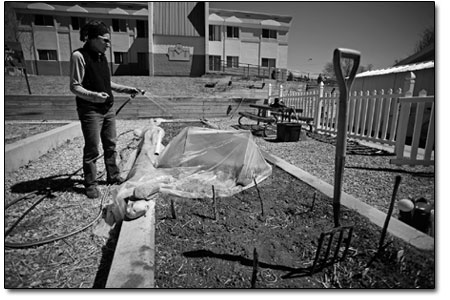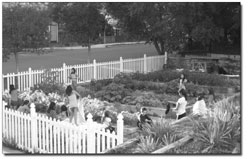|
| ||||
| Durango grown SideStory: Digging in
by Missy Votel A new kind of foot soldier is marching into Durango. Armed with pitchforks, work gloves and shovels, the Urban Land Army has taken to local trenches, digging in against big agriculture and anemic, suspect grocery store produce. And chances are, they won’t stop until the sweet taste of Victory Garden tomatoes is theirs. But the Urban Land Army is not alone. They are among many local insurgent groups with the goal of eradicating weedy lots, overgrown parking strips and neglected back yards from Hesperus to Hermosa and replacing them with everything from green chiles to gladiolas. “Basically, it’s all about linking gardeners and beginning farmers with available land and increasing local food production,” said Katie Kelly, who founded the Durango Urban Land Army chapter. A junior at Fort Lewis College, she started the ULA as a community learning project for a new class, Community-Based Agriculture. “I wanted to do something that had to do with sustainability and agricultural networking,” she said. Her research led her to the Seattle web-based organization, which has now branched out to several other major cities. “Basically, there’s an interactive map where landowners can put themselves on, or people can see what’s going on around the county,” she said. “It’s sort of like Facebook for farmers.” Since launching the project last month, Kelly said there has been a lot of interest, with the first “land links” made this week for an empty lot near Seventh Avenue and Second Street on the south side as well as an area near Bondad. Kelly, who is originally from St. Louis, said she became acquainted with small-scale farming last summer living in Durango. “I was living in a house with four apartments and we started a garden,” she said. “Eating your own food and sharing the harvest was so much fun. Once you eat something freshly picked, you can't go back to eating your food any other way. there's no comparison between a homegrown tomato and those waxy ones at the grocery store." But community gardens don’t have to be just about veggies. Rebekah Guss, who is part of the farmer equation of the land link on the south side, said she will most likely use the 4,000-square-foot lot for a “flower field.” Last summer, Guss, a Southside resident, started the Southside Community Garden at Durango Housing Corp. apartments on Fifth Avenue. Although the garden was open to anybody, she said the children who live in the apartments ended up being her most loyal cohorts. “It turned into more of a youth educational garden and teaching kids how to garden,” she said. Although they grew mostly vegetables and herbs on the five 100-square-foot raised beds, she said flowers proved to be the most popular item. “We had a huge range of stuff, but since the focus was on food, we had to do fewer flowers. And the kids really like to pick flowers.” However, with the addition of four more beds this spring, nearly doubling her capacity for veggies, Guss thought flowers would be a nice change for the nearby empty lot, owned by local architect Sarah Wright. Plus, with the costs associated with soil testing and the possibility of soil contamination, a nonedible crop would not only be easier but safer. “I thought, wouldn’t it be neat if people in the neighborhood could just walk over and pick a flower or just enjoy the beauty of it?” said Guss. As for the Southside Community Garden, Guss said a recent spring work day netted 15 volunteers, mostly kids. “They’re ready for the season,” she said. “I call those gardens my victory gardens because they’re a victory in education
Getting kids involved in community agriculture is also the goal of the Garden Project of Southwest Colorado, which has been going strong since 1998. In that time, the Garden Project has been involved in or implemented 12 garden sites, said founding member Shari Fiztgerald. “Our mission was to work with low-income and at-risk youth,” said Fitzgerald “But since then, community interest has been so strong that we’ve expanded to include seniors and the pub Fitzgerald said every year, the Garden Project tries to start one new garden, while providing services for others. This year, the group will embark on a new garden at Needham Elementary School. Past projects also include gardens at Manna Soup Kitchen, Fort Lewis Mesa Elementary, the Durango Senior Center, and the Commons Building (which will be expanded this year). Fitzgerald said another goal is to try to teach new community gardeners the tricks of the trade. "We are trying to keep people from reinventing the wheel," she said. To that end, the Garden Project recently acquired the "Tool Mobile," a 5-by-8-foot travel trailer full of gardening tools and supplies. The Tool Mobile should also help Fitzgerald and the other two “part-part time” employees and the dozen or so volunteers, keep up with demand. “We worked with 10 service groups and logged 1,000 volunteer hours last year,” said Fitzgerald. “We get so many phone calls from people looking for community garden sites or information.” In fact, interest is so great, that a community garden training last weekend at Fort Lewis College drew 40 participants. “I think the timing is just right,” she said. “People are really committed to sustainable agriculture and growing their own food.” CSU Horticulture Extension Agent Darrin Parmenter agrees. This week’s Southwest Marketing Network, an annual gathering of food experts including farmers, ranchers, farmers market managers, tribal and government representatives, and sustainable agriculture activists, met in Durango, drew more than 200 participants. The common goal of the conference was finding ways to get more “good food” — healthy, local, green, fair and affordable — on people’s tables across the region. In addition, Parmenter said La Plata County Commissioners have shown serious dedication to expanding small-scale agricultural opportunities, from Ignacio to Marvel to Durango. One successful example is the Shared Harvest community garden, on County Road 234. Started several years ago, the garden now has 60 families sharing the work and harvest from the half-acre plot. At the Extension Office, Parmenter said there’s been a huge increase in public interest in shared farming, and gardening in general. “On average, we get five to 10 calls a week from people wanting to start a backyard garden,” he said. The topic has proven so popular that next fall, the Extension Office if offering a nine-week Home Scale Food Production class, taking people from planting seedlings to food preservation. Parmenter believes the poor economy as well as the “buy local” message are partially responsible for the surge in interest. “The message is finally creeping into the local mindset,” he said. And while the groundswell may seem new, the idea of small-scale agriculture is one that’s as old as, well, dirt itself. But Parmenter doesn’t need to go quite that far back to prove his point. “Back in the ’40s and ’50s, the Extension Office was all about teaching people moving West how to manage their land and grow their own food,” he said. “For us, it’s fantastic. We’ve come full circle.” •
|
In this week's issue...
- May 15, 2025
- End of the trail
Despite tariff pause, Colorado bike company can’t hang on through supply chain chaos
- May 8, 2025
- Shared pain
Dismal trend highlights need to cut usage in Upper Basin, too
- April 24, 2025
- A tale of two bills
Nuclear gets all the hype, but optimizing infrastructure will have bigger impact



